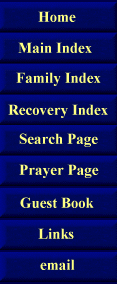

|

|
Accountability
"And why do you look at that speck that is in your brother's eye, but do not notice the log that is in your own eye? "
Or how can you say to your brother, 'Let me take the speck out of your eye,'and behold, the log is in your own eye?"
"You hypocrite, first take the log out of your own eye, and then you will see clearly to take the speck out of your brother's eye."
Matthew 7:4-6, (NASB)
People suffering from addiction or in recovery have no monopoly on defense mechanisms. Alcoholics, addicts, and Al-Anons are not the only people who practice denial. We are simply "better" at it than most. Avoiding accountability by assigning blame is one of the primary tools of denial.
When there is something amiss in our lives, the natural human tendency is to seek an outside cause instead of looking inside of ourselves. There is always one available, if we but have the ingenuity to discover it. Most often, we need look no further than the people closest to us. Not surprisingly, they are doing exactly the same thing, and we are their target of opportunity. Suddenly, we are caught up in "The Blaming Game".
This game, also know as "taking someone else's inventory", is one of the most pointless and destructive pastimes available to humankind. Blaming obviously puts us in direct conflict with those we would have shoulder the responsibility for our circumstances, including, all too often, our Heavenly Father. Worse, blaming allows us to ignore those character traits and behaviors in ourselves which desperately need attention.
This second aspect of the "blaming game" is the primary topic of this article. Through this vehicle, we prevent meaningful change for the better in our lives, and we block the work of sanctification. Only when we are willing to honestly look at our own accountability can the Holy Spirit empower us for growth.
At a seminar I attended, one of the slogans was "When we assign blame, we give away our power." I have often meditated on the meaning of this simple slogan and have used it frequently in my work with others suffering from addiction. I have come to believe that it contains a profound truth about life in general and recovery in particular, for hidden within this slogan is the fact that if we are in no way responsible for our circumstances, we are powerless to change them.
Virtually every circumstance in our lives, whether good or bad, is the result of a combination of factors. Other people, random chance (if there is such a thing), providence, and our own decisions, feelings, and actions all contribute. If we focus on those factors which are outside of us, we necessarily concede that there is nothing that we can do about the circumstance, for if we did everything we could in the best possible way and still things turned out badly, then we are helpless and hopeless victims.
Unfortunately, there is something about human nature that makes it more comfortable for us to see ourselves as victims than as having been wrong. We would rather be "right" than happy, peaceful, joyful, or productive. If difficult circumstances befall us, we seek to feel superior and blameless by assessing others as solely in the wrong. We are constantly on the lookout for others with more defects of character than we have. When this is inadequate to allay our feelings of guilt and shame, we turn to a chemical or a behavior that masks the pain. In the mean time, our circumstances do not improve.
Seeking an alternative solution, we try to change the things outside of ourselves, especially the people. If we can make these other people who are to blame for our circumstances behave properly, our difficulties will disappear. We employ, with complete justification, we believe, escalating levels of manipulation, intimidation, and possibly violence to improve the guilty parties' behavior. We become more convinced than ever ofthe righteousness of our cause. Amazingly, our circumstances, rather than improving, deteriorate markedly as we face increasing resentment and hostility from those around us.
At this juncture, we face a turning point. We can apply ever increasing amounts of chemical or behavioral pain killers, or we can turn humbly to God and ask Him for the strength and grace to look at our own contributions to our circumstances with honesty. This is a prayer that our Heavenly Father is delighted to grant.
When we begin to honestly assess our own accountability, we first produce positive change in our own lives. When we can find a way in which we have contributed to our problems, we gain a handle on the only aspect of those problems we can change. There are three things no one can change: God, the past, and other people. That leaves only ourselves. Even this requires God's help.
As an illustration, let me relate a recent experience of mine. A few days ago, I received notice of a tax collection action resulting from the period when I was married to someone who was chemically dependent. The details are not relevant, but suffice it to say that my wife and I are now faced with a financial burden that is both overwhelming and, particularly from my wife's perspective, unfair. My former spouse's contributions to this set of circumstances are many and make a convenient target. In fact, without the grace of Our Lord, they would be irresistible. They would also be pointless.
After about a day of wallowing, I made the conscious effort to determine my points of accountability. To my surprise, I had a many! First and foremost, I had abdicated any semblance of a leadership role in my home at that time. I chose instead to pursue a policy of appeasement in the hopes of keeping a semblance of peace at any cost. I refused to "rock the boat", even though rocking the boat was the only way to keep it from sinking.
What have I gained from finding my own accountability? Much in every respect. First, I have gained a release from paralyzing bitterness. Second, I have gained insight into my own shortcomings which will help me, by the grace of God, to avoid repeating the mistakes of the past. Finally, I have gained the peace that comes from being able to "Let go and let God".
The final aspect of the blaming game is the way in which it prevents us from being effective witnesses and change agents in the lives of others. Judgment and attempts to control are very poor motivators. If you doubt this, simply harken back to some occasion when you were nagged, scolded, judged, or ordered to do something. Compare your reaction then with an occasion when someone lovingly confronted you about your behavior (if you have ever had such an experience). From the point of view of the person confronted, everything depends on the motive of the person doing the confronting. If the motivation is self-centered justification of the confronter's own righteousness, then the one confronted will almost certainly resist. If, however, the confronter has cleansed their own life with self-honesty, then they are able to lovingly hold up a steady mirror for their brother to see and remove the splinter from their own eye.
|
If you want to learn more, read What We Believe. If you are ready for a change in your life like the one I have experienced, click here. |